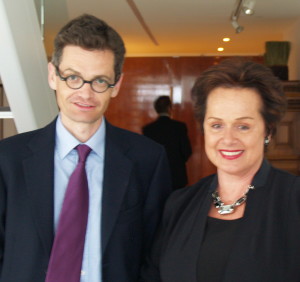
Amid media disruption, a community of readers still matters
On Wednesday, May 28, 2014 IFE’s Media and Technology Roundtable (MTR) met at the Ambassador of Liechtenstein’s immaculately modern residence for a dinner hosted by Her Excellency Claudia Fritsche, and featuring special guest speaker David Rennie, Washington Bureau Chief and Lexington columnist for The Economist.
In attendance were IFE Founder and CEO Coach Kathy Kemper, IFE Steward Chris Caine, IFE Innovation Steward Dr. Amy Geng, MTR Cofounder Shane Green, R. David Edelman, White House Senior Advisor for Internet, Innovation and Privacy Policy at the Office of Science and Technology Policy and the National Economic Council.
Representing the White House Presidential Innovation Fellows (PIFs), innovators recruited from the private sector to find ways to leverage technology in government services, were Geoff Mulligan and Sokwoo Rhee. Through the leadership of IFE’s Emerging Markets Roundtable Cofounder John Paul Farmer, PIFs have become mainstays at IFE events, and we’re thrilled with their insights and contributions.
After welcoming remarks by Ambassador Fritsche, Marci Robinson, Chair of IFE’s Board of Stewards, introduced Mr. Rennie. Robinson noted that he has reported from almost 50 countries, an impressive achievement in a journalist who is just into his 40s.
Rennie framed his remarks around the question; Will the Internet save serious newsgathering or kill it? Taking a historical perspective, he noted that the old models of advertising-driven commercial journalism have been exploded by web-based services that leverage data to connect consumers to products better than a print ad ever could. Hence, traditional journalism outlets have suffered as advertisers look elsewhere and readers are increasingly confronted by what Rennie called “a swarm of bees”—opinions and speculation mixed in with reliable reporting on the Internet.
Rennie suggested that there is still an important role for trusted journalism brands in the new media landscape. “Size matters,” he observed. Officials are more likely to respond to interview requests when they come from a respected publication with a sizable community of informed and engaged readers. Rennie called community a “powerful drive” for public accountability.
He illustrated the pitfalls of a new era of “free” news with a story of a televised campaign event that he watched in West Virginia. A Senate candidate delivered a speech to an empty patch of ground at a coal processing plant, filmed only by her own TV crew, with the footage sent free of charge and live to local TV stations. This strange spectacle looked like a normal rally to viewers, but allowed the candidate to avoid tough questions from independent news organizations. Rennie suggested that a future without professional reporters paid to keep politicians honest will see many more of these kinds of staged events.
Technologists outnumbered journalists at the event, so the conversation inevitably sharpened its focus on digital horizons. Shane Green and R. David Edelman traded observations on the balance between liberating big data as a driver of entrepreneurship, and protecting privacy, a right guaranteed under the US Constitution. Edelman expressed reservations about the widespread use of facial recognition technology, a technique that promises to improve advertising and services but might cross an important privacy line. Passwords, user names and e-mail addresses can all be changed; your face is your face.
Rennie closed the evening with an anecdote also about online identity. He noted that his digital presence has been somewhat complicated lately by revelations that a Toronto Salvation Army director, also bearing the name David Rennie, was charged last year with stealing a massive cache of toys from the organization, to be resold on the black market. A cautionary tale in an age when everyone will be Googled eventually.
Contributed by Mark Schulte, IFE Fellow
View: Event Photos | Guest List | David Plotz: We are in a golden age for journalism
Read Rennie’s recent articles: What does the Fox say? | Keeping the mighty honest
ABOUT OUR GUEST: David Rennie joined The Economist in 2007 as European Union correspondent and Charlemagne columnist, based in Brussels. From July 2010 to July 2012 he was British political editor and author of the Bagehot column, based in London. In the summer of 2012 he moved to Washington DC to become Lexington columnist. Previously he was on the foreign staff of the Daily Telegraph, with postings in Sydney (1998), Beijing (1998 to 2002), Washington DC (2002-05) and Brussels (2005-07). From 2006 until he joined The Economist, he was also a contributing editor of the Spectator magazine. He worked for the Daily Telegraph in London (1996-98), and the Evening Standard (1992-96). He has given classes and public lectures on EU affairs at the universities of Harvard and Boston in America, Bristol University in Britain and at the business schools ESCP (Paris) and IE (Madrid). He won the 2010 UACES/Thomson Reuters “Reporting Europe” award. He is a frequent guest on radio and television news programs.